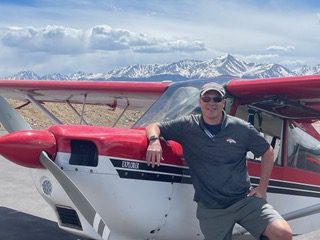Rob Lawton - Flight Instructor
Aspen Flying Club
| Flight Instructor: |
CFI, CFII, Mountain |
| Certificates Held: |
Airline Transport Pilot Multi Engine Land, Commercial Single Engine Land, Instrument Rated |
| Education: |
Boston University; Embry-Riddle Aeronautical University |
Rob learned to fly in the Navy in the T-34C Mentor and later went on to fly SH-60 Seahawk helicopters. Since leaving active duty Navy, he joined the Colorado Army National Guard where he flew the UH-60 Blackhawk for 20 years before retiring in 2020. Rob also spent some time as an Aviation Safety Inspector with the FAA at the Denver FSDO. Additionally, Rob has flown the CRJ and A320 at three previous airlines, as a First Officer and Captain; he currently flies the Boeing 737 for a major airline.
Rob is a part-time instructor available a few times each week, and can accommodate a client most days of the week, by prior appointment. After serving as a military pilot nearly 25 years, Rob is also happy to provide guidance for those seeking a military flight school appointment or current/former military pilots seeking to convert their military ratings to civilian equivalent or add-on ratings. For Rob, “flying is a passion and inspires him every day.” For a safe, thought-provoking, and enjoyable flying experience, just schedule him for a flight.
5 useful questions to ask an instructor:
Why did you become a flight instructor?
Regardless of the answer, the way an instructor talks about why they fly is what is important. Look for
someone that is excited by teaching. They should have a genuine interest in giving others the gift of flight.
How long have you been flight instructing?
Some Instructors have thousands of hours under their belts and have been flight instructing for their entire
careers. Others have a few hundred and are just beginning. A seasoned instructor will have a lot of experience
but may have a set teaching style. A freshly minted instructor has less aircraft time but is able to relate to
common learning obstacles, having undergone their own flight training in the not too distant past. There are
advantages to both types of instructor.
How do you keep track of your student’s progress?
Using a syllabus is essential so that both student and instructor can track progress and milestones so make
sure your instructor uses one. Talk to other students and ask them what kind of reading their doing, what
books they’re using and the type of homework they’re getting. There should ALWAYS have some type of “homework”
assignment at the end of each lesson.
What is your availability?
Some instructors are part-time and work separate jobs during the week. Others are full-time, but may want to
have personal and family time on the weekends. Find an instructor with compatible availability. Flying at least
twice a week is the best way to progress quickly through accomplishments with less effort and less overall costs.
Choosing an instructor that is able to fly on the same schedule helps to keep flight training on a consistent path.
I’ve heard people talk about “stalling an airplane.” Can you tell me what it means?
This is a classic question. Regardless of knowing what an “aircraft stall” is or not, how an instructor explains
this concept will give great insight into how they can explain concepts. Are they patient? Do they use simple
terminology that is easy to understand? Do they ask questions to make sure their student understands, or do they
over simplify to brush off the question? Find an instructor whose instructing style is a good match.

